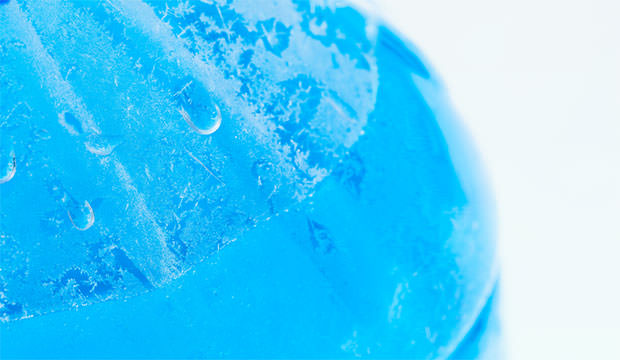
In fact, certain ingredients are extremely dangerous to dogs.
Avoid all of the following when buying dog food or dog treats, or considering sharing any human food with your pet.
1. Propylene glycol
Propylene glycol is a colorless liquid that can be used as a solvent. It is often found in antifreeze solutions, and it can be added to human cosmetic products like shampoos and face creams.
Some manufacturers will add propylene glycol to semi-moist brands of kibble in order to stop from becoming completely dry, but you should try to avoid any food with this ingredient (and certainly avoid feeding it to your dog on a regular basis).
It is toxic to dogs when eaten in large enough amounts, and some studies have connected it to potentially dangerous changes in the brain, liver and kidneys.
2. Chocolate
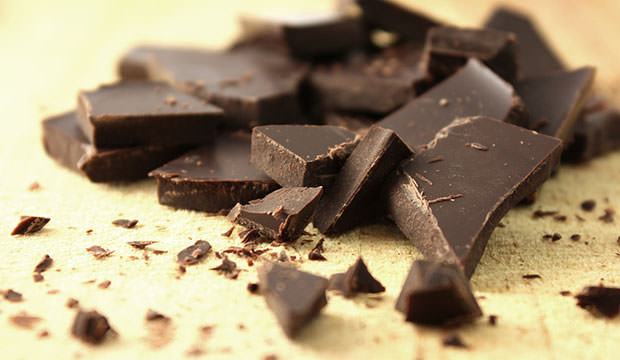
Any form of milk and dark chocolate is highly dangerous to your dog’s body and is capable of causing a whole host of unpleasant symptoms.
At best, your dog may feel nauseated, vomit and suffer from diarrhea after eating chocolate. However, when a large quantity of chocolate is eaten, the results can be devastating.
Dogs have been known to have seizures, experience abnormal heart rhythms and sometimes even die.
You might think that giving a small amount of chocolate cannot cause any harm, but it is best not to take the risk. Despite its delicious flavor, chocolate certainly won’t help your dog to feel happy and well. If your dog is much smaller than average, then even a small amount of chocolate could come close to providing a toxic dose.
According to the American Society for the Prevention of Cruelty to Animals (ASPCA), as little as four ounces of milk chocolate could cause serious harm to a dog that weighs ten pounds. Dark chocolate is even more potently toxic.
3. Ethoxyquin
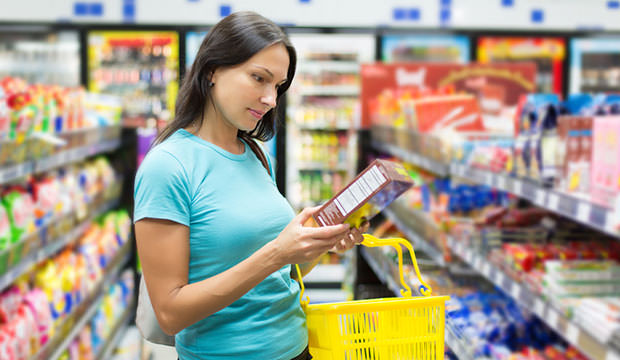
Even though research is so far inconclusive, and as such is still ongoing, many pet owners are taking the sensible precaution of avoiding ethoxyquin in the food they give to their pets.
Ethoxyquin was originally developed as a herbicide, though it is also used in rubber production. It is associated with a number of alarming health problems that could put your pet in jeopardy.
Even if your dog happily wolfs down his food, ingredients such as this one could mean that the food isn’t actually supporting his health.
In dogs, ethoxyquin has been connected to an increased likelihood of developing cancer. As a result of years of research, it seems as though dogs exposed to the highest levels of ethoxyquin are more likely to develop immune deficiencies, overactive or underactive thyroid glands, reproductive problems and kidney failure.
Check the ingredients list of the type of pet food that you usually buy. If ethoxyquin is listed as an ingredient, then you should consider changing to a different brand right away. Making your own dog food is another way to stop potentially harmful preservatives making their way into your dog’s diet.
4. Onions
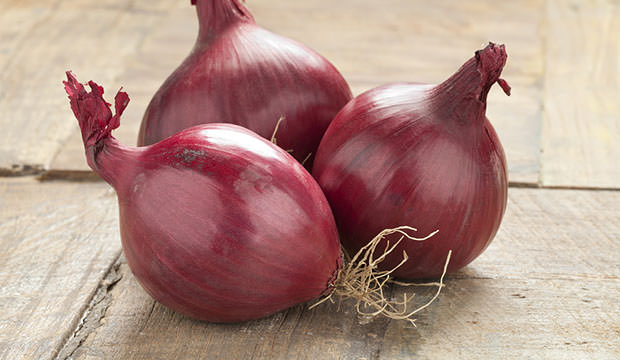
However, you should do your very best to prevent your dog from consuming any onions. Yes, they are tasty, but they are not very good for your pet.
Besides, dogs don’t mind eating meat that hasn’t been flavored. Eating onions can change your pet’s blood cells, putting him at risk of developing anemia.
This serious condition can lead to insufficient levels of oxygen being delivered to the dog’s muscles and vital organs.
A dog that is suffering from anemia will appear very tired and not at all his usual playful self. Other symptoms include a reduction in appetite, generalized weakness, reduced levels of activity, pale gums and a rapid, weak pulse. If examined by a vet, a heart murmur may also be noticed.
If you suspect that your dog has anemia, you should take him to a vet to get some professional advice. The best strategy, however, is to prevent this condition from developing in the first place. Cutting out onions and feeding your dog plenty of iron-rich food can help to protect him from suffering from anemia.
5. FD&C Blue No. 2.
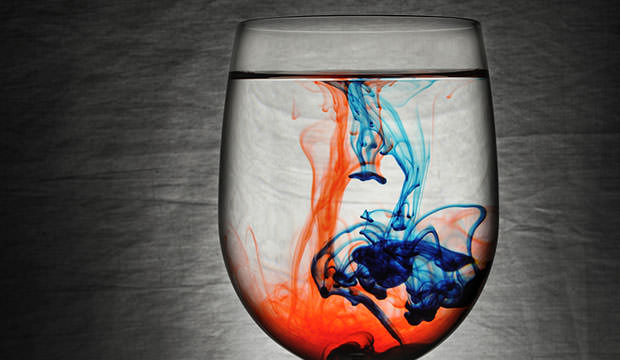
There is no reason to feed this artificial additive to your dog, so you should avoid buying any pet food that includes it.
What does FD&C Blue No. 2 actually do to your dog? Well, for one thing, one large study on its safety strongly suggested that this dye is capable of causing brain tumors to develop in mice (especially male mice).
In humans, there have been concerns that Blue No. 2 might be connected with serious allergic reactions and learning difficulties.
There has not been much research into the effects of the chemical specifically in dogs, but the findings in other mammal species suggest that it could potentially be harmful.
Furthermore, FD&C Blue No. 2 is very close in composition to Blue No. 1, which has caused dangerously low blood pressure levels, discolored skin and excessive levels of acid in the body. Excessive acid can cause acid reflux, reduced appetite and vomiting.
Your dog will not suffer at all from cutting out FD&C Blue No. 2. Only buy commercial pet foods that do not contain this potentially dangerous chemical.
6. Sweeteners (natural and artificial)
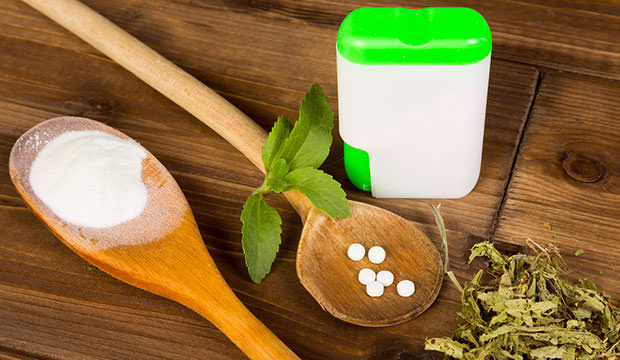
Dogs should not be encouraged to develop a sweet tooth! Natural sweeteners are connected to hypoglycemia in dogs, which can effect energy levels.
Dogs that are usually fed on overly sweet food can swing between hyperactivity and exhaustion, just like children who eat too many sweets!
Sugars and corn syrup also promote obesity. Being significantly overweight in turn lowers life expectancy by increasing your pet’s chances of developing heart disease or suffering from strokes.
In addition, sugar is terrible for your dog’s teeth, causing decay and potentially leading to infections or abscesses forming in the mouth. Meanwhile, artificial sweeteners can be downright toxic to dogs. If your dog eats a lot of xylitol, sorbitol or any other sweetener ending in -ol, then you might notice that he gets an attack of the runs.
This effect also occurs in humans, as you might know if you have ever binged on artificially sweet candy.
Your pet will not miss the added sweetness that comes with sugar or artificial sweeteners. Cut these additives out of the diet as much as possible.
7. Macadamia nuts
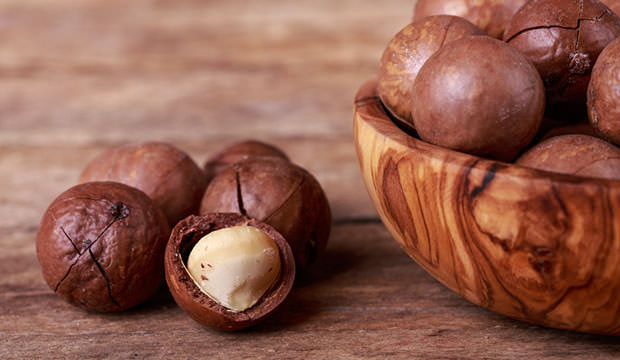
You should never give these nuts to your dog, no matter how cute his puppy eyes are.
While the mechanism of action remains unclear at this point, there is evidence to support the claim that macadamia nut consumption can cause muscle weakness, widespread tremors and even paralysis in your pet.
Experiencing these symptoms can be very scary for both dogs and their owners. The paralysis is usually in the hind legs, and can be accompanied by a high body temperature.
Individual sensitivity varies between dogs, but since there is no way of knowing whether your dog will have a severe reaction, then it is smart to avoid any food or treats that contain macadamia nuts as an ingredient.
Macadamia nuts are found in many human cereals and snacks. You probably should avoid giving these types of foods to dogs anyway, as they are usually high in sugar as well. If you see macadamia nuts listed as an ingredient on a packet of food that you are eating, then you should make an extra special effort to keep that food away from your dog.
8. Grapes and raisins
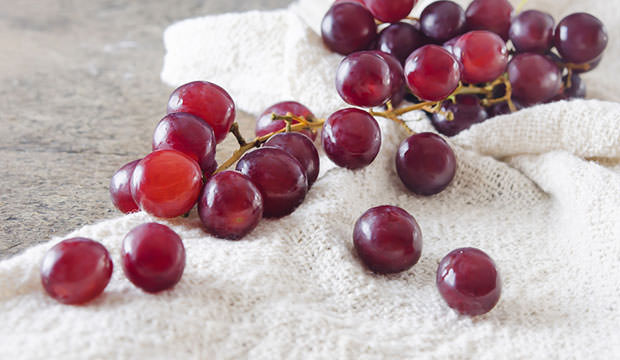
The frightening truth is that we still don’t yet know why these foods are so toxic to our canine friends. However, we do know that they are very harmful.
In particular, grapes and raisins have been shown to trigger acute kidney failure in dogs, leading to vomiting, diarrhea, intense abdominal pain, reduced urinary output and eventually death.
Many of the dogs that do survive after ingesting grapes or raisins end up having shortened lifespans due to kidney damage.
Dogs with kidney trouble may need to be on a special diet (as well as medication) for the remainder of their days. You can spare your dog from suffering the effects of kidney damage by keeping it away from grapes and raisins. Make sure that your kids know that they should not feed these foods to the family pet.
If you want to give fruit to your dog, then blueberries, apples (minus the seeds) and seedless watermelon are safe options. These juicy options could be very enjoyable for your pet on a hot summer day.
9. Animal fat

Specifically, the only requirement for calling a product “animal fat” is that it is obtained from animal tissue.
There is no obligation for the manufacturer to either state the source or to use a particular source.
As a result, the animals used for this ingredient could be slaughtered, but they could also have died of natural causes, been euthanized at animal shelters or come from road kill.
Many of these sources do not produce meat that is fit for human consumption, and you should question whether it is even fit for your dog.
Always opt for pet food that makes its meat sources abundantly clear, so you know that it has come from healthy animals that have been well cared for.
Well sourced animal fat is safe for your dog to eat in moderate amounts, but take care not to include too much fat in your dog’s diet. Being overweight is just as bad for dogs as it is for humans! Always trim the fat off beef and pork before giving it to your pet.
10. Avocado
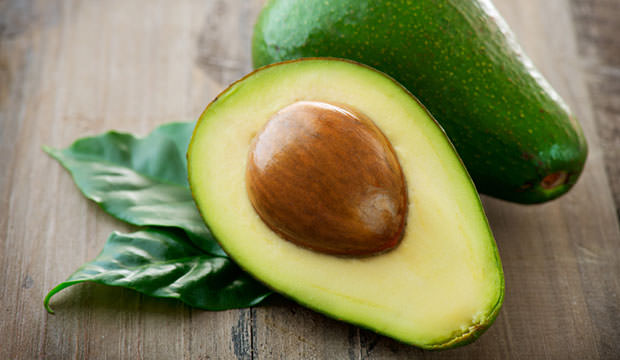
This substance is present in all parts of the avocado in amounts high enough to cause harm to dogs. Small dogs are particularly vulnerable to being harmed by eating avocados.
Exposure to persin can cause respiratory problems in some small animals, leading to severe breathing problems.
This naturally occurring chemical can also cause pleural effusion, which involves fluid collecting in the chest cavity.
In some cases, consumption of avocado can even be fatal. While the problems caused by eating avocados rich in persin tend to be more pronounced in birds and rabbits than in dogs, avocado consumption can still be expected to cause gastric problems like nausea and vomiting in the family pooch.
Because of the potential harm it can cause to small animals, avocado is always best avoided in dog food. Yes, your dog might whine about not being allowed to slurp up your leftover guacamole, but it really is in his best interests to keep him away from it. Treat him with a dog-friendly snack instead to keep him quiet.
11. Beef and bone meal
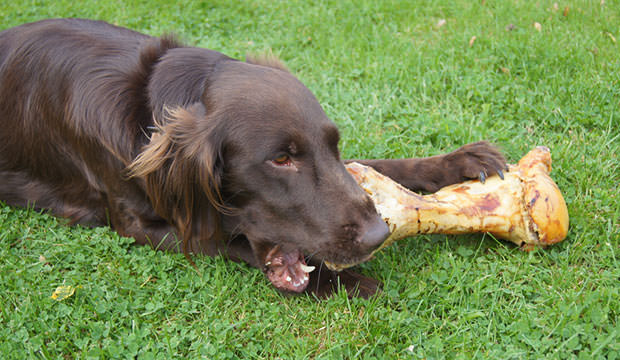
This highly processed product is often added to dog food because it is a cheap filler ingredient that can increase the protein percentage of the meal at very little extra cost.
However, food that contains a lot of beef and bone meal is not necessarily giving your dog everything he needs to thrive.
Since it is ruled as unfit for human consumption, beef and bone meal never includes quality cuts of meat and could involve any other part of the cow, including the bones, hooves or cartilage.
Your dog will not get the same nutrients from these parts as he would from a decent cut of high quality meat.
Your dog will be much better off if he obtains his protein from high quality cuts of meat, which can be found in many of the more health-conscious brands of dog food. Alternatively, you could cook meat at home to give to your dog, so that you know exactly what he is eating.
Any type of lean meat will do, as long as you do not add any spices or sauces that could harm your pet.
12. Dough
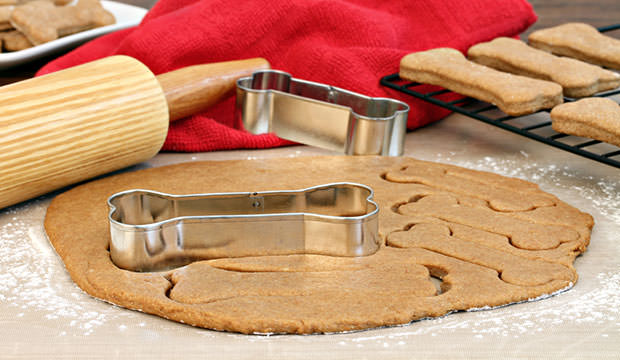
Like most foods, bread dough can easily be snapped up by a curious and hungry pup, but that doesn’t mean that it is a suitable food for your canine friends.
Once bread dough enters a dog’s stomach, the conditions are perfect for the yeast to breed and multiply.
As the yeast multiply and feed on the dough, they release bubbles of carbon dioxide gas. The result is that the dough quickly swells to a volume far larger than the piece that was originally ingested.
As this rapid expansion occurs, it can cause enough pressure to limit the blood flow to the dog’s stomach wall, causing breathing problems and damaging stomach tissue.
Another problem is that the yeast found in bread dough naturally produces alcohol as a byproduct of the breeding process, and this can cause intoxication. Alcohol intoxication is not anywhere near as much fun for dogs as it is for humans. In fact, it can trigger vomiting, seizures and even comas.
Next time you are baking bread, make sure you put the dough in a safe location to let it rise without being stolen by your dog.
13. Salt
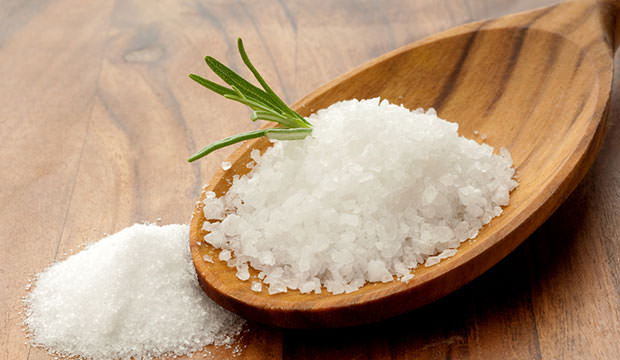
In large quantities, salt promotes a range of different health problems for dogs.
For example, it boosts blood pressure levels, increasing your pet’s chances of developing heart disease and suffering from heart attacks and strokes.
It can also put extra strain on the kidneys, promoting eventual renal failure. While your dog does need salt, if it is listed as an extra ingredient in food, then this is often a sign that the other ingredients are of poor quality. The goal of extra salt in dog food is often to add flavor in order to make the food more appealing to your pet.
Cheap brands of pet food are often the worst offenders when it comes to adding too much salt to food. Manufacturers of high quality pet food instead use good ingredients like real meat and vegetables to make their products appeal to your pets.
In large quantities, salt promotes a range of different health problems for dogs. For example, it boosts blood pressure levels, increasing your pet’s chances of developing heart disease and suffering from heart attacks and strokes. It can also put extra strain on the kidneys, promoting eventual renal failure.
In order to help your dog to stay fit and healthy well into his old age, you should make sure his salt intake stays relatively low. In addition, look out for all the other harmful foods listed here. Feeding your dog well gives him the best possible chance of living a long and healthy life.

Animal fat is a necessary part of a dog’s diet and, when fed as part of the raw diet, should not be trimmed from the meat. I actually have pure fat trimmed from some Scottish Highland cattle (grass fed Scottish Highlands, yum!) from a local Scottish Highland breeder for lean meals. Too little fat can cause its own problems. Rabbits and some other animals are very lean and, when those are fed as a staple, you need to find fat from another source. The packages of fat I have come in perfectly handy for those meals! It is absolutely right,… Read more »
Wow, I had no idea that onions could be so bad for your pet! Just the fact that they can put them at risk of developing anemia is a HUGE reason to stay as far away from them as possible. In fact, I think I think I am going to look around online for some pet feed, and see if I can find anything that avoids absolutely everything on this list!